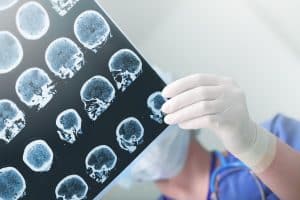The Effects of an Undiagnosed Traumatic Brain Injury
 The brain is the body’s command and control center, and brain damage can result in frightening consequences. The insidious aspect of traumatic brain injury (TBI) is that symptoms might take hours or even days to manifest.
The brain is the body’s command and control center, and brain damage can result in frightening consequences. The insidious aspect of traumatic brain injury (TBI) is that symptoms might take hours or even days to manifest.
If you suffer a traumatic brain injury (TBI) due to a motorcycle accident, a slip and fall accident, a construction accident, or some other high-impact event, you need to seek competent medical treatment immediately. Failure to do so can be debilitating or even deadly.
The risks
Below is a list of some of the misfortunes you risk by delaying or ignoring medical treatment after a head injury. The more serious the head injury and the longer you delay treatment, the more devastating the consequences.
Balance and coordination issues
Untreated head injury can damage your brain’s ability to maintain coordination and spatial awareness. This can lead to balance and coordination problems that might not arise until some time after you suffer a head injury.
Chronic headaches
Chronic headaches and migraines are common symptoms for victims of TBI. Often this malady is progressive, meaning that it gets worse and worse over time. In brain injury patients, headaches are often the last symptom to abate. Ignoring frequent or severe headaches can turn a temporary problem into a chronic, debilitating problem.
Cognitive difficulties
Cognitive difficulties can be subtle, and the victim as well as their friends and relatives might not even attribute these symptoms to head injury. Common cognitive difficulties include memory loss, lapses in attention, impaired executive function (planning, for example), and slow processing speed. Many head injury victims suffer some degree of memory loss, even with prompt medical treatment.
Degenerative brain diseases
Some evidence suggests that an untreated TBI may cause various degenerative brain diseases such as Parkinson’s disease, Alzheimer’s, and other forms of dementia. These diseases get worse and worse over time. Medical attention immediately after a head injury can reduce the risk of a degenerative disease. Muhammad Ali is perhaps the most famous example of someone who apparently developed Parkinson’s disease due to a head injury from his boxing career.
Emotional problems
Untreated TBI can lead to emotional problems such as depression, anxiety, isolation, aggressive outbursts, and various personality changes.
Permanent brain damage
Permanent brain damage is a possible consequence of any head injury. A serious head injury can cause bleeding or swelling in the brain or even skull fractures that can cause bone to penetrate the brain. Medical treatment might include surgery to relieve pressure in the skull. Without such surgery, the brain might press against the skull, leading to progressively severe brain damage.
Poor sleep
Head injury victims often have trouble falling asleep, frequent awakening, daytime sleepiness, and impaired sleep cycles. Lack of sleep in turn causes other problems such as anxiety, moodiness, and impaired physical and mental recovery from trauma.
Second impact syndrome
Second impact syndrome (SIS) occurs when you suffer a second head injury before the first injury has fully healed. SIS is deadly dangerous, with a mortality rate approaching 50% due to rapid brain swelling. Many of the surviving half still suffer from SIS-induced permanent brain damage. If you suffer a head injury in an athletic endeavor, wait until you are fully healed before you start playing again.
Seizures
Seizures range in severity from brief staring spells that resemble daydreaming to full-body convulsions. Some patients suffer seizures immediately after their head injury, while others do not experience them until months or years later. A head injury can trigger full-scale post-traumatic epilepsy.
Sensitivity to light and noise
This is a telltale sign of TBI. People with these symptoms often cannot tolerate lighted environments that other people find normal. Even ordinary sounds, such as music on the radio, become unbearably intense for people suffering from these symptoms. These symptoms can persist long after the initial injury.
Compensation for brain injury
Compensation for brain injuries tends to be high because so many brain injuries are catastrophic in nature. Below is a rundown of liability as well as the types of compensation you might qualify for.
Liability
You cannot recover damages for brain injury unless you can prove that someone’s misconduct caused your injury or made it worse.
Crashes and other accidental injuries
Car accidents, pedestrian incidents, and other unexpected injuries are some of the leading causes of TBIs. If someone caused the injury, you might be able to recover damages.
Institutional negligence
You might assert institutional negligence as a basis for TBI damages if, for example, you suffered a head injury in a football game because your college provided you with a substandard helmet.
Missed diagnosis
Your doctor might have failed to diagnose your head injury due to medical negligence. In this case, you would not be asserting that the doctor caused your head injury, but that they made it worse by failing to diagnose it early enough.
Damages
North Carolina recognizes three types of damage: economic damages, noneconomic damages, and punitive damages. North Carolina also recognizes the principle of contributory negligence.
Economic damages
Economic damages include easily countable losses such as medical expenses and lost earnings. Many TBI patients, however, require lifelong medical care. Likewise, many TBI patients suffer a permanent loss of earning capacity which can add up to a lot of money if they were young at the time of their injury.
Noneconomic damages
Noneconomic damages include intangible amounts such as pain and suffering and emotional distress. Typically, non-economic damages amount to far more than economic damages.
Punitive damages
Courts award punitive damages when the defendant engages in outrageous conduct. North Carolina limits punitive damages to three times the compensatory damages (economic + noneconomic damages) or $250,000, whichever is greater. Courts rarely award punitive damages, even to victims who win economic and non-economic damages.
Contributory negligence
Contributory negligence is a harsh doctrine that only North Carolina and a handful of other states apply. Under contributory negligence, you lose all of your compensation if you were even slightly at fault for your own injuries. If your doctor misdiagnosed you due to an error on your medical history report or undisclosed information (if you filled it out), the doctor might assert a contributory negligence defense.
Seek medical assistance, then legal assistance
Your medical needs come before your legal needs, of course. Nevertheless, when you suffer due to someone else’s misconduct, justice demands a response. TBI claims do not enforce themselves, but a seasoned attorney can help you enforce yours.
Price Petho & Associates is a Charlotte, NC personal injury law firm that does not pull punches. We will fight relentlessly to ensure that you get the compensation you deserve. And remember, with us you only pay attorney’s fees if you win. Contact us today to schedule a consultation.

Attorney Doug Petho is the owner and founder of Price, Petho & Associates. His primary focus is the litigation of plaintiff’s personal injury suits, and he has successfully tried hundreds of cases to jury verdict involving car accidents, trucking accidents, pedestrian accidents, slip and fall accidents, and work-related accidents. Contact his office in Charlotte today.
